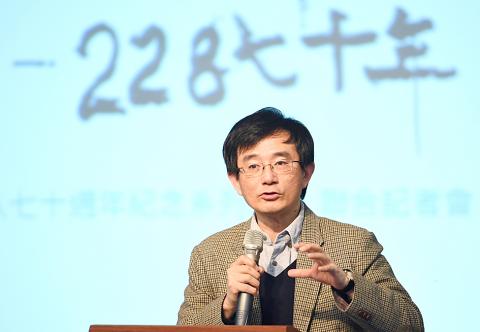The Ill-gotten Party Assets Settlement Committee’s measures to seize illicit Chinese Nationalist Party (KMT) assets would fulfill the long-standing wishes of 228 Incident victims, representatives of victims’ families said yesterday.
Speaking at a news conference, the representatives also expressed their support for the government’s efforts toward transitional justice.
“We have been compensated, but the entire nation had to pay for it, not the perpetrators,” Taiwan 228 Incident Care Association director-general Pan Hsin-hsing (潘信行) said, adding that seizure of KMT assets by the committee would cover the costs of compensation.

Photo: Liu Hsin-de, Taipei Times
“The committee’s moves to handle the issue are exactly what we filed for years ago, but failed to attain,” he said, referring to a suit brought by victims’ families to have the KMT pay compensation.
Committee Chairman Wellington Koo (顧立雄) had served as a pro bono lawyer for the families in the suit, he said, adding that the families have no legal connection with the committee.
The government-funded 228 Memorial Foundation has provided more than NT$7.2 billion (US$234 million at the current exchange rate) in compensation to more than 9,900 victims and family members in connection with the Incident, which refers to the crackdown launched by the then-KMT regime against civilian demonstrations following an incident in Taipei on Feb. 27, 1947. The event also marked the beginning of the White Terror era, which saw thousands of Taiwanese arrested, imprisoned and executed.
This year’s commemoration has drawn attention, as it is the first since President Tsai Ing-wen (蔡英文) took office, even as legislature aimed at attaining transitional justice waits at the Legislative Yuan.
Foundation chairman Hsueh Hua-yuan (薛化元) called for the government to take immediate action to preserve documents related to the Incident.
“We have to find a way to overcome the issue of how and whether to present personally identifiable information when publishing the documents, but what I am more concerned about is that many documents are difficult to find because they are not explicitly labeled as being connected with the Incident,” he said, calling for a halt to the destruction of any government document while the transitional justice process is under way.
“The highest compensation was paid to victims in Changhua County, because police tracking records and name lists were found, but Kaohsiung, Keelung, Taipei and Chiayi were all more serious. However, no such complete documentation has been found there,” he said, adding that important documents might be destroyed unless academics are given rights to review them.
Pan also said that a foundation report assigning responsibility for the Incident to Chiang Kai-shek (蔣介石) should be recognized by the government.
“We are glad that the true face behind the incident has come to light, but the government has yet to recognize the report as an official conclusion,” he said, adding that official recognition would provide legal grounds for changing curriculum guidelines and removing Chiang’s statute from the National Chiang Kai-shek Memorial Hall in Taipei.
“All the evidence points to Chiang being responsible for the Incident, so he should have to pay a price,” he said, adding that the slow pace of transitional justice was “understandable.”

A strong continental cold air mass is to bring pollutants to Taiwan from tomorrow, the Ministry of Environment said today, as it issued an “orange” air quality alert for most of the country. All of Taiwan except for Hualien and Taitung counties is to be under an “orange” air quality alert tomorrow, indicating air quality that is unhealthy for sensitive groups. In China, areas from Shandong to Shanghai have been enveloped in haze since Saturday, the ministry said in a news release. Yesterday, hourly concentrations of PM2.5 in these areas ranged from 65 to 160 micrograms per cubic meter (mg/m³), and pollutants were

Taiwan’s armed forces have established response protocols for a wide range of sudden contingencies, including the “Wan Chun Plan” to protect the head of state, the Ministry of Defense (MND) said today. After US President Donald Trump on Saturday launched a series of airstrikes in Venezuela and kidnapped Venezuelan President Nicolas Maduro, concerns have been raised as to whether China would launch a similar “decapitation strike” on Taiwan. The armed forces regularly coordinate with relevant agencies and practice drills to ensure preparedness for a wide range of scenarios, Vice Minister of National Defense Hsu Szu-chien (徐斯儉) told reporters before a

EVA Airways on Saturday said that it had suspended a pilot and opened an investigation after he allegedly lost his temper and punched the first officer several times as their plane was taxiing before takeoff at Los Angeles International Airport. According to a report published on Thursday by The Reporter, the incident occurred after the flight’s Malaysian first officer tried to warn the Taiwanese pilot, surnamed Wen (文), that he was taxiing faster than the speed limit of 30 knots (55.6kph). After alerting the pilot several times without response, the first officer manually applied the brakes in accordance with standard operating

NOT AN OPENING: Trump’s violation of international law does not affect China’s consideration in attacking Taiwan; Beijing lacks capability, not precedent, an official said Taiwanese officials see the US’ capture of the president of Venezuela as a powerful deterrent to Beijing’s aggression and a timely reminder of the US’ ability to defeat militaries equipped with Chinese-made weapons. The strikes that toppled Venezuelan President Nicolas Maduro signaled to authoritarian leaders, including Chinese President Xi Jinping (習近平), US President Donald Trump’s willingness to use military might for international affairs core to US interests, one senior official in Taipei’s security circle said. That reassured Taiwan, the person said. Taipei has also dismissed the idea that Trump’s apparent violation of international law could embolden Beijing, said the official, who was not